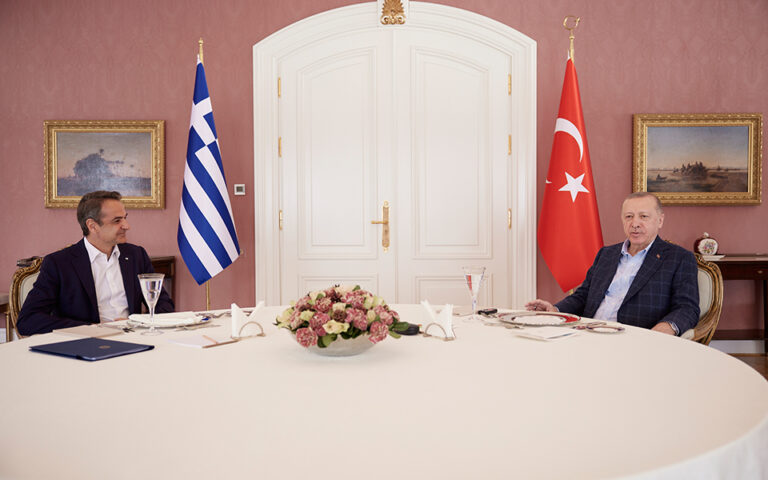By George Gilson
As war rages in Ukraine and even wayward NATO allies like Turkey rally behind the US in its conflict with Vladimir Putin’s Russia over the war in Ukraine, shaking the foundations of Turkish President Recep Tayyip Erdogan’s marriage of convenience with Putin, the Turkish president through his one-hour meeting with Prime Minister Kyriakos Mitsotakis in Istanbul today, signalled an at least temporary cease-fire in his war of words – a real truce is a long way off – against Greece over Ankara’s claims in the Aegean and the Eastern Mediterranean.
Far more importantly, perhaps, Turkey’s authoritarian leader is signalling to Washington that, after his stubborn insistence on keeping Russian S-400 missile systems (that epitomised the tight Russo-Turkish embrace glaringly reflected when Ankara, in November, 2015, got away with downing with F-16 fighter jets a Russian Su-24 all-weather attack aircraft at the Turkey-Syria border), the procurement of which has enraged the US executive and Congress as well as NATO, that he may be prepared – possibly with a quid pro quo that brings Greece into the picture – to return to the fold on his best behaviour.
Turkish presidency readout
That appeared to be message, after the Mitsotakis-Erdogan talks, conveyed in a statement issued by the Turkish presidency, which spoke of turning a page in Greek-Turkish relations and asserted that “the problems of the Aegean, minorities, combating terrorism, illegal migration should move forward at a higher level.”
Effectively, however Erdogan has not moved an inch in pursuing a wide array of claims and challenges to Greek sovereignty, and the PM must make tough calls on what more Athens may legitimately negotiate, without compromising sovereignty and national interests.
One additional issue Athens may be prepared to discuss is the breadth of Greek airspace in the Aegean, as international law says that the extent of airspace must match that of territorial waters. Greece has a 10-mile airspace (established by presidential decree in 1931 and reaffirmed by Athens in 1988) but only six nautical miles of territorial waters.
Although under international law Greece can double that to 12nm, the Turkish Grand National Assembly in 1995 passed a resolution that such a move would constitute a casus belli, and no Greek government has dared to make the move. Mitsotakis will not be an exception.
Political dynasty with realpolitik
Mitsotakis is the scion of a political dynasty of Cretans – established by the great statesman Eleftherios Venizelos, whom Kyriakos Mitsotakis is wont to quote, and continued by the current PM’s father Konstantinos (PM 1990-1993) – that has been distinguished by a particular brand of patriotic realpolitik.
Venizelos realised that a small country like Greece cannot weather the tempests of geopolitics without linking its fortunes to a great power. Venizelos’ clear choice was then Great Britain, a choice that reaped significant benefits for Greece, and after the disaster of the Asia Minor war in1922 he fervently and successfully pursued a strategy of friendship with Turkey (even nominating Kemal Ataturk for the Nobel Peace Prize).
The policy of both the current PM and his father (as well as of his sister, former foreign minister Dora Bakoyannis) toward Turkey has been one of pursuing an honourable realpolitik-based rapprochement.
Undoubtedly that tradition, which Kyriakos Mitsotakis espouses, will influence his approach to Greek-Turkish negotiations, in the framework of the current domestic political environment, which is considerably less rigid than in past decades, in large measure due to Ankara’s clearly and steadfastly aggressive military posture.
Although the Greek government continues to insist, as it has for decades, that the only bilateral issue that needs to be resolved is the delimitation of the continental shelf and the two countries’ EEZz, the PM must now make tough choices, and it behoves him to swiftly hammer out a national consensus in doing so.
With many Greek analysts today comparing Putin’s use of a Russian minority in a neighbouring country as a specious pretext for invasion and occupation to Turkey’s pretext for invading and occupying Cyprus in 1974, a more contemporary, urgent, and exceptionally dangerous parallel may be found in Turkey’s manipulation of the Muslim minority in Western Thrace, with the thinly veiled, long-term objective of political autonomy in a region of Greece.
That is the minority to which the Turkish presidency referred in its statement today, and Ankara has for decades unceasingly placed it on the table in bilateral talks.
Erdogan’s big fat Turkish wish list
In line with the standard Turkish diplomatic practice of high-level officials publicly declaring Ankara’s maximalist positions ahead of important Greek-Turkish bilateral meetings, including summits such as today’s, on 7 March the spokesman for Erdogan’s Justice and Development Party (AKP), Ömer Çelik, said that the two leaders would discuss the full range of Turkish claims against Greece – including the demand that Athens demilitarise certain ones of its Aegean islands adjacent to the Turkish coast, where NATO’s largest landing force, the so-called Aegean Army, has threatened Greek security for decades – the delimitation of the Aegean continental shelf (for decades Athens has said this is the only issue it can legitimately negotiate with Ankara under the terms of international law), and the overarching and paramount demand, that is the underpinning of all others, that Athens and Ankara more or less equally share major natural gas deposits in Greece’s Exclusive Economic Zones (EEZ) in the Eastern Mediterranean and the Aegean.
It is pursuing the same objective much more aggressively with the Republic of Cyprus, where Turkey occupies 37 percent of the island and is clamouring for a two-state solution in which Turkish-Cypriots, subjugated by Ankara, and Turkey will proportionally get the lion’s share of the major gas deposits in the EEZ of the Republic of Cyprus.
Mitsotakis and the Greek military have reacted to Ankara’s expansionist demands with a combination of clear composure and firm decisiveness.
Mitsotakis’ blitzkrieg of diplomatic alliances
Since the PM came to power in July, 2019, he has responded to Erdogan’s bombastically articulated revisionist, neo-Ottoman demands and his military efforts to pursue them on the ground with a strategy that has combined a well-planned and structured diplomatic blitzkrieg, combined with fast-track moves to achieve on the ground the much-delayed modernisation of the Hellenic Armed Forces (halted due to Greece’s essential bankruptcy in 2010, that fortunately was not disorderly due to a series of massive EU and IMF bailout packages that came with unprecedented austerity attached, and the ensuing 10-year economic crisis, later much aggravated by the pandemic crisis) with a huge investment in military procurements from France (Belharra frigates and Rafale fight jets), that will give Greece’s Air Force and the Hellenic Navy a substantial advantage and reduce the military imbalance with Turkey, which has for years successfully developed its own strong arms industry, even becoming an exporter.
Deeper strategic military alliances with US, France
Firstly, the PM rightly chose to strategically deepen, at a moment of enormous global geopolitical fluidity and revisionism, Greece’s critical alliance with the US, with a vastly expanded and now indefinite US-Greece Mutual Defence Cooperation Agreement (the MDCA, signed on 14 October 2021 by Foreign Minister Nikos Dendias and US Secretary of State Anthony Blinken in Washington) that now includes a strategically critical US base in the port city of Alexandroupolis, not very far from the border with Turkey, the significance of which was highlighted by expressions of consternation from both Ankara and Moscow.
Secondly, Mitsotakis through arduous negotiations established the Greece-France military cooperation agreement, which includes an unprecedented in the EU framework mutual defence pact, requiring each of the parties to come to the defence of the other when its sovereign territorial integrity is threatened by a third country with the force of arms (many analysts, including former PASOK foreign minister Evangelos Venizelos, a constitutional scholar, have not unreasonably suggested that it is highly doubtful that this includes maritime zones, especially when their delimitation has not been concluded, as is the case with Greece and Turkey in several instances).
While few believe that either the US or France will fight at Greece’s side in the event of a Greek-Turkish military clash or war, the symbolism that is always crucial in domestic and international politics is strong and can function as a substantial deterrent against Turkish aggression.



